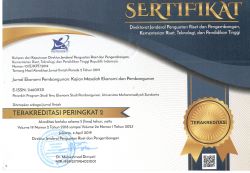Does Health Contribute to Economic Growth? An Evidence from Regional Levels in Indonesia
Vita Kartika Sari(1), Malik Cahyadin(2*), Aranka Ignasiak-Szulc(3)(1) Department of Development Economics, Universitas Sebelas Maret
(2) Department of Development Economics, Universitas Sebelas Maret
(3) Department of Economic Policy and Regional Studies, Nicolaus Copernicus University
(*) Corresponding Author
Abstract
Health can lead economic development in many countries. The higher the quality of health, the more space for increasing economic growth and providing prosperity in the long-run. The current study attempts to estimate the effect of health on regional economic growth in Indonesia. Balanced panel data is set covering 34 provinces from 2015 to 2020. The panel data is estimated using system Generalized Method of Moments (GMM). The findings reveal that smoking level contributes significantly and positively on regional economic growth, while health service has no effect. The non-linear impact of smoking level on regional economic growth is U-shaped. It means that higher smoking level stimulates regional economic growth by the increasing of aggregate spending. The local governments should design health service program and control smoking level properly so that the health risk of cigarette consumption does not offset its benefit to the economy. The policy design will produce better human health and life in all provinces in Indonesia. Consequently, the regional economic growth can be achieved in the long-run.
Keywords
Full Text:
PDFReferences
Blundell, R., & Bond, S. (1998). Initial conditions and moment restrictions in dynamic panel data models. Journal of Econometrics, 87(1), 115–143. https://doi.org/10.1016/S0304-4076(98)00009-8.
Central Bureau of Statistics. (2022). Badan Pusat Statistik Indonesia. Laporan Data Sosial Ekonomi. www.bps.go.id.
Cole, W. M. (2019). Wealth and health revisited: Economic growth and wellbeing in developing countries, 1970 to 2015. Social Science Research, 77, 45–67. https://doi.org/10.1016/j.ssresearch.2018.09.003.
Cylus, J., & Al Tayara, L. (2021). Health, an ageing labour force, and the economy: Does health moderate the relationship between population age-structure and economic growth? Social Science and Medicine, 287, 114353. https://doi.org/10.1016/j.socscimed.2021.114353.
Gavurova, B., Rigelsky, M., & Ivankova, V. (2020). Perceived health status and economic growth in terms of gender-oriented inequalities in the OECD countries. Economics and Sociology, 13(2), 245–257. https://doi.org/10.14254/2071-789X.2020/13-2/16.
Genoni, M. E. (2012). Health Shocks and Consumption Smoothing: Evidence from Indonesia. Economic Development and Cultural Change, 60(3), 475–506. https://doi.org/doi:10.1086/664019.
Gong, L., Li, H., & Wang, D. (2012). Health Investment, Physical Capital Accumulation, and Economic Growth. China Economic Review, 23, 104–111. https://doi.org/doi:10.1016/j.chieco.2012.07.002.
Hartwig, J. (2010). Is health capital formation good for long-term economic growth? - Panel Granger-causality evidence for OECD countries. Journal of Macroeconomics, 32(1), 314–325. https://doi.org/10.1016/j.jmacro.2009.06.003.
Husain, M. J. (2010). Contribution of Health to Economic Development: A Survey and Overview. Economics, 4(1). https://doi.org/10.5018/economics-ejournal.ja.2010-14.
Kennelly, B., O’Callaghan, M., Coughlan, D., Cullinan, J., Doherty, E., Glynn, L., Moloney, E., & Queally, M. (2020). The COVID-19 pandemic in Ireland: An overview of the health service and economic policy response. Health Policy and Technology, 9(4), 419–429. https://doi.org/10.1016/j.hlpt.2020.08.021
Lustig, N. (2006). Investing in health for economic development. In Unu-Wider Research Paper (No. 2006/30).
Mackenbach, J. P., Meerding, W. J., & Kunst, A. E. (2011). Economic costs of health inequalities in the European Union. Journal of Epidemiology and Community Health, 65(5), 412–419. https://doi.org/10.1136/jech.2010.112680.
Mankiw, G. N., Romer, D., & Weil, D. (1992). A Contribution to the Empirics of Economic Growth . Quarterly Journal of Economics, 107(2), 407–437.
Mankiw, N. G. (2017). Principle of Macroeconomics 7th Edition. Worth Publishers.
Marti, J., & Schläpfer, J. (2014). The economic impact of Swiss smoking bans on the hospitality sector. Economics Letters, 124(1), 136–139. https://doi.org/10.1016/j.econlet.2014.05.007.
MIHALACHE, I. C. (2019). Health State of Human Capital in the Economic Theory. Postmodern Openings, 10(4), 182–192. https://doi.org/10.18662/po/102.
Narayan, S., Narayan, P. K., & Mishra, S. (2010). Investigating the relationship between health and economic growth: Empirical evidence from a panel of 5 Asian countries. Journal of Asian Economics, 21(4), 404–411. https://doi.org/10.1016/j.asieco.2010.03.006.
Ogundari, K., & Awokuse, T. (2018). Human capital contribution to economic growth in Sub-Saharan Africa: Does health status matter more than education? Economic Analysis and Policy, 58, 131–140. https://doi.org/10.1016/j.eap.2018.02.001.
Romer, P. M. (1986). Increasing Return and Long Run Growth. Journal of Political Economy, 95, 1002–1037.
Ruhm, C. J. (2000). Are recessions good for your health? Quarterly Journal of Economics, 115(2), 617–650. https://doi.org/10.1162/003355300554872.
Sharma, R. (2018). Health and economic growth: Evidence from dynamic panel data of 143 years. PLoS ONE, 13(10). https://doi.org/10.1371/journal.pone.0204940.
Solow, R. M. (1956). A contribution to the theory of economic growth. Quarterly Journal of Economics, 70(1), 65–94. https://doi.org/10.2307/1884513.
Torre, D. La, Marsiglio, S., Mendivil, F., & Privileggi, F. (2019). A stochastic economic growth model with health capital and state-dependent probabilities. Chaos, Solitons and Fractals, 129, 81–93. https://doi.org/10.1016/j.chaos.2019.08.010.
Vu, T. V. (2020). Economic complexity and health outcomes: A global perspective. Social Science and Medicine, 265, 113480. https://doi.org/10.1016/j.socscimed.2020.113480.
Wang, K. M. (2011). Health care expenditure and economic growth: Quantile panel-type analysis. Economic Modelling, 28(4), 1536–1549. https://doi.org/10.1016/j.econmod.2011.02.008.
Wang, K. M., Lee, Y. M., Lin, C. L., & Tsai, Y. C. (2018). The effects of health shocks on life insurance consumption, economic growth, and health expenditure: A dynamic time and space analysis. Sustainable Cities and Society, 37, 34–56. https://doi.org/10.1016/j.scs.2017.10.032.
Weil, D. N. (2007). Accounting for the effect of health on economic growth. Quarterly Journal of Economics, 122(3), 1265–1306. https://doi.org/10.1162/qjec.122.3.1265.
Zaidi, S., & Saidi, K. (2018). Environmental pollution, health expenditure and economic growth in the Sub-Saharan Africa countries: Panel ARDL approach. Sustainable Cities and Society, 41, 833–840. https://doi.org/10.1016/j.scs.2018.04.034.
Zhao, J., & Zhou, N. (2021). Impact of human health on economic growth under the constraint of environment pollution. Technological Forecasting and Social Change, 169, 120828. https://doi.org/10.1016/j.techfore.2021.120828
Article Metrics
Abstract view(s): 1213 time(s)PDF: 846 time(s)
Refbacks
- There are currently no refbacks.

















